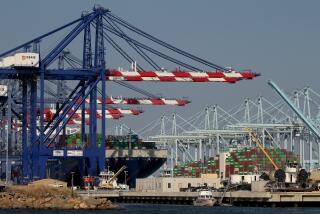Great Lakes Carriers in Canada Face Hard Times
- Share via
MONTREAL — Canadian Great Lakes shipping firms are in the midst of their worst financial crisis since the St. Lawrence Seaway opened 26 years ago.
The problem: reduced grain shipments caused by a glut on the international wheat market and by a severe drought that has destroyed large portions of western Canada’s wheat crop this year.
“We’re talking millions of dollars in losses,” Norman Hall, president of Dominion Marine Assn., said. “Lake carriers are hurting significantly. Some of them are taking a good hard look at the situation and trying to determine how they can survive this kind of recession.” The DMA represents all Canadian shipowners in the St. Lawrence Seaway system. Of its 134 member ships, 48 are lying idle somewhere on the 2,342-mile system that links Duluth, Minn., with the Gulf of St. Lawrence.
Shipments Down 32%
“Imagine, 35% of the fleet is tied up,” Hall said. “There’s not a heck of a lot left. It’s a very tight year. There is always the danger that smaller shipping companies could fold.”
Canadian grain shipments from the Thunder Bay, Ont., terminus were down 32% as of mid-August compared to the same period last year--8 million tons, compared to 12 million tons last year. The reduced grain shipments have brought traffic volume down 25%.
If the trend continues through the seaway’s Dec. 15 winter closing, 1985 shipments would total only 86 million tons of goods, compared to 114.8 million tons in 1984. It would be the worst year volume-wise since 1963.
Compounding the problem for Canadian shippers has been the loss of United States grain traffic to unit trains and barges plying the Mississippi River.
American barge companies and railways have successfully wooed U.S. grain exporters with low rates to fill the shipping void left by the depressed steel industry in the northern United States.
‘Excess Capacity’
In 1980-81, Canadian Great Lakers shipped more than 8 million tons of American grain from the U.S. ports of Duluth, Chicago and Toledo. That figure was down to 2 million tons last year.
“There is excess capacity on the Mississippi and they (barge companies) are offering pretty cheap rates,” Hall said.
Competition on the world wheat market also is fierce. The United States is expecting a bumper crop this year, and the Common Market has subsidized wheat crops heavily to win a greater share of the export market. The Soviet Union, one of Canada’s main export markets, also is expecting a good wheat crop.
Shipowners also are appearing before the Canadian Transport Commission to try to work out a new contract with the Laurentian Pilotage Authority. The LPA is seeking higher wages for pilots and a new formula for calculating charges.
More to Read
Sign up for Essential California
The most important California stories and recommendations in your inbox every morning.
You may occasionally receive promotional content from the Los Angeles Times.













